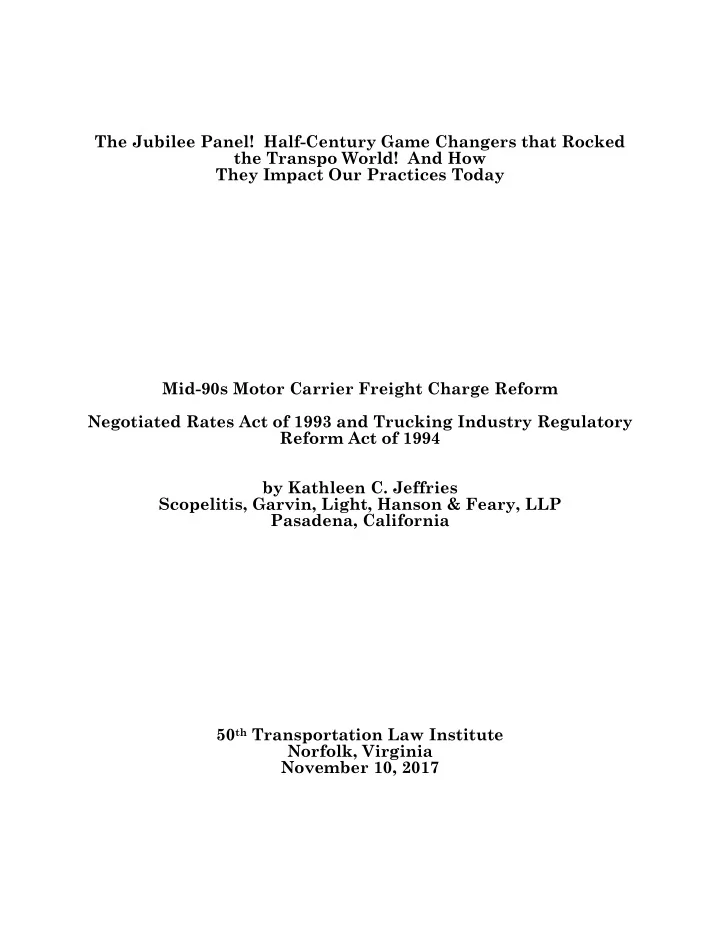

The Jubilee Panel! Half-Century Game Changers that Rocked the Transpo World! And How They Impact Our Practices Today Mid-90s Motor Carrier Freight Charge Reform Negotiated Rates Act of 1993 and Trucking Industry Regulatory Reform Act of 1994 by Kathleen C. Jeffries Scopelitis, Garvin, Light, Hanson & Feary, LLP Pasadena, California 50 th Transportation Law Institute Norfolk, Virginia November 10, 2017
Mid-90s Motor Carrier Freight Charge Reform Negotiated Rates Act of 1993 and Trucking Industry Regulatory Reform Act of 1994 For many years, interstate trucking was heavily regulated by the Interstate Commerce Commission (“the ICC”). Beginning in the late 1970s, a series of administrative and legislative actions liberalized regulation of the industry, culminating in deregulation in 1980. Though deregulation had its significant benefits, it was not entirely without pitfalls. Deregulation of trucking industry rates resulted in great turmoil in relationships between carriers and shippers, leading to conflicting positions taken by the ICC and the Supreme Court, and ultimately requiring action by Congress to calm the waters. Background As a consequence of deregulation of the trucking industry through the Motor Carrier Act, Pub.L.No. 96-296, 94 Stat. 793 (1980) (“the MCA”), the number of licensed motor carriers more than doubled in the 1980s. As anticipated, deregulation resulted in increasingly fierce competition among carriers. For most of the 20th century, motor carrier rates were highly regulated by the ICC pursuant to the Interstate Commerce Act (“the ICA”). Under the “filed rate doctrine,” common carriers 1 were required to file with the ICC tariffs containing their rates and could not charge a different rate unless that rate was filed as well. 49 U.S.C. §§ 10761 and 10762. The primary purpose behind mandating the collection of filed rates was to prevent carriers from discriminating among shippers in the pricing of services. The ICA contained an explicit prohibition on “unreasonable discrimination” by motor common carriers. The filed rate doctrine was designed to further this objective by foreclosing the possibility that carriers maintain one rate on file while either negotiating another (secret) lower rate with some shippers or providing those shippers with illegal rebates or discounts. The doctrine thus protected smaller shippers from being undercut competitively. The MCA, though intended to promote competition among carriers, did not abolish the filed rate doctrine. Many carriers, however, in response to the increased competition fostered by the MCA, negotiated and charged rates lower than those filed with the ICC. A substantial number of carriers did not survive in the competitive environment. What followed was a plethora of cases filed by bankrupt trucking companies or their trustees in virtually every federal jurisdiction in the nation to recover the “undercharge” amounts - the difference between the filed rate that a trucking company was legally required to charge its customers and the lower rate negotiated with and paid by the customers. Shippers who had negotiated in good faith rate discounts found themselves billed by the bankruptcy trustees or debtors for the full rate. 1 The tariff-filing requirement underlying the filed rate doctrine applied to motor common carriers, not to motor contract carriers, whose rates were set out in continuing, individual agreements with their particular customers. 49 U.S.C. § 10102(16).
To thwart these claims, the ICC took the position that a carrier attempting to collect a filed rate after having negotiated a lesser rate engaged in an “unreasonable practice” in violation of the ICA, thus, in effect, repealing the filed rate doctrine. NITL—Pet. to Institute Rulemaking on Negotiated Motor Common Carrier Rates , 3 I.C.C.2d 99 (1986), as modified by 5 I.C.C.2d 623 (1989). The Supreme Court, however, applied the filed rate doctrine strictly, often with harsh results. Shippers were charged with constructive knowledge of the rates, and were thus liable for the filed rate even if a carrier intentionally misquoted the applicable rate. In 1990, the Court invalidated the ICC’s “unreasonable practice” regulation, ruling, in Maislin Industries, U.S., Inc. v. Primary Steel, Inc. , 497 U.S. 116, 135-36, 110 S.Ct. 2759, 2770-71, 111 L.Ed.2d 94 (1990), that “[i]f strict adherence to §§ 10761 and 10762 as embodied in the filed rate doctrine has become an anachronism in the wake of the MCA, it is the responsibility of Congress to modify or eliminate these sections.” The Maislin decision turned the trickle of undercharge suits into a torrent of litigation. Congress estimated that, as of 1993, undercharge claims filed by bankrupt trucking firms approached $32 billion. 1993 Enactment of the Negotiated Rates Act In response to Maislin and the worsening “undercharge crisis,” Congress enacted the Negotiated Rates Act of 1993, Pub.L. No. 103-180, 107 Stat. 2044 (1993) (“the NRA”). The NRA offered shippers options and defenses to undercharge claims on interstate shipments through a three-tiered scheme: small businesses, charities and shippers of recyclable materials were exempted from undercharge suits; other shippers had the option of settling claims by carriers or forwarders no longer transporting property at five to 20 percent of their value (20 percent for a shipment of 10,000 lbs. or less; 15 percent for a shipment over 10,000 lbs.; and five percent where the payor was a public warehouse); and, for a transportation service negotiated prior to September 30, 1990, shippers had the alternative option of challenging any claims by a defunct carrier or freight forwarder as an unreasonable and unlawful practice, with jurisdiction given to the ICC to determine the unreasonable practice. Congress, through the NRA, did more than just address the undercharge crisis. They reformed a number of other rate-related rules and regulations. The Act established prospective requirements that identified the precise information that must be included in tariffs filed by common carriers; shortened the statute of limitations for the filing of claims by a motor common carrier or freight forwarder for recovery of transportation or service charges and by any person to recover overcharges by a motor carrier to 36 months; required a motor contract carrier to enter into a written agreement (separate from a bill of lading or receipt) for the provision of transportation
Recommend
More recommend